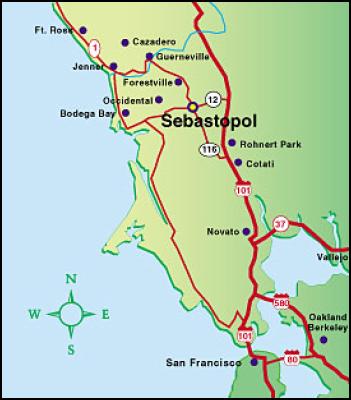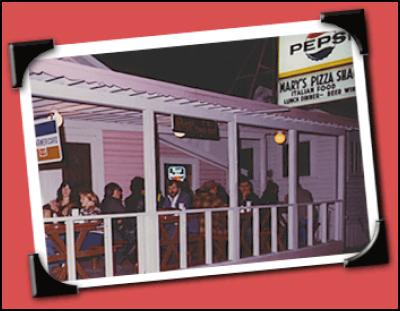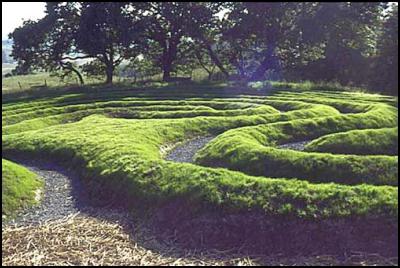The Community Wizard of Sebastopol – Part 1
Mapping the Real Deal…
The Community
Wizard of Sebastopol
By Catherine Austin Fitts
Part One of Three
With Special
Thanks to
Caroline W. Casey
And the
Reuniting
Magic & Money Tour
How knowledge behaves as an economic resource, we do not yet fully understand…We need an economic theory that puts knowledge into the center of the wealth-producing process. —Peter F. Drucker

IMAGE: Map Of Sebastopol
A Community Wizard’s Magic
You can tell them by the twinkle and intelligence that emerges when they are present. Indeed, there is nothing outwardly about a Community Wizard that gives them away –they prefer to go unnoticed.
I am sitting in a pizza parlor in Sebastopol, California, a town of approximately 8,000 in Sonoma County north of San Francisco. I am in the presence of a powerful Community Wizard. After years of experience in banking systems and community banking, this Community Wizard of Sebastopol insists that he is not knowledgeable about financial engineering. He says he is interested in people.
Community Wizards organize their lives around people and relationships. No matter how rich their technical expertise, they make it their business to know who makes things work and to understand how they do it. They are interested in people and take the time to listen. Their mastery at understanding how things look from the other person’s point of view and how to translate that into getting things done reflects years of paying attention.
Community Wizards love their family. Their kids and grandkids always come first. They know their neighbors. They know who is connected to the electricity, water, gas, cable, pest control and other services that come into their home. They are the first to welcome a newcomer. They help people meet other people. They are perpetually useful.
Experts are generally people who understand the "power of one" when they are dealing with exceptional people or lots of money. A Community Wizard’s magic comes from helping the exceptional emerge from what appears to be mundane and ordinary. They perceive the divine in people the experts see as ordinary. Their appreciation for that divine spark in every person is part of a Wizard’s magic.
Community Wizards are masters of project and risk management. They enjoy working "on the line." They are trusted not just for their personal integrity and discretion, but because they have mastered how to make the mundane and essential transactional aspects of life flow and integrate with a precision and grace that respects other people's time. Community Wizards excel at finding ways of getting things done with little resources because they know how to get the right people in alignment around a project. They appreciate that "a penny saved is a penny earned."

IMAGE: The Original Mary's Pizza Shack Near Sebastopol
Community Wizards include the local school principal who taught for many years and the independent trucker who runs the volunteer fire brigade. Community Wizards started the community bank or were the county executive. They sit on the town council and support the local business, farm, sports or civic group. They include the pastor and co-pastor that created scores of jobs building their storefront church to thousands of members. Community Wizards started the local Internet service provider in their parent’s gas station garage, and got the local funeral home on line as the first website marketing caskets through the web.
Community Wizards include the accountant or attorney that handles their family and friends most sensitive problems. They have a small cotton farm, a dental practice, a cleaning company, a tree service, a nursery, a natural healing center or a hardware store. They are a leader in the local temple who makes sure that money quickly and quietly goes to a family in need. Their beauty parlor is an incubator for community and home businesses.
Community Wizard's respect for other people is matched by their reverence for all living things. Their pets and plants are happy. They often have a garden or orchard. In California, they like to go for long walks in redwood forests. Community Wizards are the farmers who often win awards for their conservation efforts. They become architects and urban planners. They revitalize shipyards and navigate the local rivers. Community Wizards love weather maps and study the patterns of the tides and stars around them. They can explain the rock formations under their street in terms of what happened during the Paleolithic Age. They donate to the upkeep of trees and bushes around the local historical monument.
Like the Community Wizard of Sebastopol, they are worthy stewards of the resources in a place. Community Wizards have earned what the Chinese call t'ien ming ---“the mandate of heaven. [1]” A place has a soul and an intelligence that is independent of any person or organization. Community Wizards know this and delight in cultivating the soul and intelligence of the place they call home.

IMAGE: In Sebastopol – A Cretan Retreat
The Fiduciary of a Place
The world of investment is organized around the notion of a fiduciary. A great fiduciary is someone who cares for the resources in his or her care as if they were their own. Webster’s dictionary defines a fiduciary (noun) as “ one that holds a fiduciary relation or acts in a fiduciary capacity” and a fiduciary (adjective) as “ of relating to, or involving a confidence or trust: as a. held or founded in trust or confidence, b. holding in trust, c. depending on public confidence for value or currency.”
When we manage financial capital, life is much more simple than when we manage a business or a place. A portfolio of stocks, go up and down and performance can be measured mathematically. A money manager can relate to the concept of the different businesses, and is freed from direct and organic involvement with lots of different very human employees and customers. Indeed, over time, investment fiduciaries have tried to build their investments to be as insulated from dependency on humans and the risks associated with human greed and emotion. That is part of the fear that gives rise to the type of government credit and insurance programs that we are now experiencing and that end up destroying economies, as accountability is lost.
Functioning as the fiduciary of a place is in many respects much more complex than as an investment fiduciary. Value creation relates to numerous forms of human and intellectual capital that are difficult to measure and rarely priced mathematically, let alone in a way that their relation to financial capital can be understood. Yet, as knowledge becomes an increasingly larger component of our wealth creation, this place based fiduciary role takes on an increasingly pivotal importance.
The way we grow a great civilization or economy starts with raising one child well, one at a time, and moves into the management and stewardship of all the people and living things within a place as well as the infrastructure that support them. Optimizing all of these resources within a place involves a mind boggling level of complexity in a world in which there are no information and pricing maps and few useful incentive systems designed to make place based optimization an easy and professional process.
In America, most school systems do not teach the fundamental economics and operations necessary for the average citizen to understand how their place works. Recently, our local pastor asked me to prepare such a curriculum for his high school students. Doing so illuminated how little is currently taught compared to the literacy that is easily possible.
A Community Wizard is someone who can be trusted to act as a fiduciary of his or her place. Their mastery is all the more special as they have typically acquired it through long years of hard work and patience in an environment that was not conducive to achieving mastery. The knowledge of how to become a great Wizard was not particular accessible, more often than not it was handed down within a family, or through a network organized around the Farm Bureau, the Chamber of Commerce, the women’s club or some local organization or network.
There are two things that are critical to understand about our present condition. Community Wizards are the trustworthy fiduciaries of a place. As we start to finance communities with equity, their fiduciary status will begin to be recognized. Their “mandate of heaven” will start to evolve to a more powerful and concrete material mandate giving them the authority and ability to start to link up in more meaningful ways.
Second, the Community Wizards current level of performance reflects decades of hard work with little support or recognition under grueling conditions. Their successful creation of local equity has been rewarded with years of draining centralization by federal credit and programs, corporate media, organized crime and Wall Street. These centralizing headwinds slowing down and draining their physical and financial security were made worse by the support that the centralizing forces have enjoyed within their own communities. Hence, the potential opportunity for what the Wizards can do with decentralizing wind in their sails is rarely understood

ENDNOTES: CLICK HERE FOR PART TWO
In Part Two, we learn about the potential of Community
Wizards to turn around our culture and economy, including
the five financial drains that are draining every community
in America: centralized government, central and centralized
banking, currency and debt, centralized savings and
investment, centralized purchases, and centralized narcotics
trafficking and organized crime.
Catherine Austin Fitts is the President of Solari, Inc. ( http://solari.com) and a former
Assistant Secretary of Housing – Federal Housing
Commissioner in Bush I. She is currently litigating with
Ervin and Associates (acting on behalf of the government )
and the Department of Housing and Urban Development. If you
would like to support her litigation efforts, you can
through Affero/ Venture Collective:
http://www.solari.com/vote.php Anti©opyright Catherine
Austin Fitts, March
2003
[1] Eventually this
concept would gain a wider application in ancient China. By
Confucius' time, the t'ien ming applied to everyone and
their obligations to see to the welfare of the people they
are related to. The Mandate of Heaven, through which Heaven
worked out its efforts to guarantee the well being of
humanity, applied to each and every obligation and action
one took and so represented what might be called the moral
order of the universe. Allied with this idea was the concept
Ming, or destiny. Heaven also ruled the physical world:
earthquakes, sickness, wealth, rain, etc, but it ruled the
physical world directly. All things that happen in the
physical world are the direct result of Heaven's actions and
are completely out of human control. The proper venue for
human action, then, is in the realm of t'ien ming . These
two concepts, t'ien ming, or the moral order of the
universe, and ming, or the physical order of the universe,
combined make the Tao, or "Way" of Heaven.
----Richard
Hooker
http://www.scoop.co.nz/mason/stories/HL0303/S00242.htm
If this “Mapping the
Real Deal” was useful for you, you can leave comments and
send a gift to Catherine Austin Fitts and Scoop Media
through Affero:
http://svcs.affero.net/rm.php?skid=smc
and receive
future columns for free by e-mail - see... Free My Scoop to sign up. ![]()


 Ian Powell: The Disgrace Of The Hospice Care Funding Scandal
Ian Powell: The Disgrace Of The Hospice Care Funding Scandal Binoy Kampmark: Catching Israel Out - Gaza And The Madleen “Selfie” Protest
Binoy Kampmark: Catching Israel Out - Gaza And The Madleen “Selfie” Protest Ramzy Baroud: Gaza's 'Humanitarian' Façade - A Deceptive Ploy Unravels
Ramzy Baroud: Gaza's 'Humanitarian' Façade - A Deceptive Ploy Unravels Keith Rankin: Remembering New Zealand's Missing Tragedy
Keith Rankin: Remembering New Zealand's Missing Tragedy Gordon Campbell: On Why The Regulatory Standards Bill Should Be Dumped
Gordon Campbell: On Why The Regulatory Standards Bill Should Be Dumped Martin LeFevre - Meditations: Psychedelics, Mystical Experiencing, And Organized Religion
Martin LeFevre - Meditations: Psychedelics, Mystical Experiencing, And Organized Religion